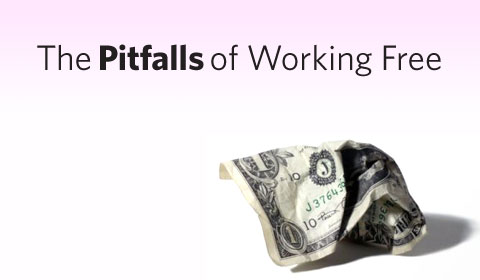Spec Work : The Pitfalls of Working For Free
It is never a good idea for an entrepreneur, freelancer or inventor to do work for free. When a freelancer agrees to do work on spec, they are simply devaluing the industry in which they are a part of.
By showing a client that you are willing to provide them with completed work without pay in the hope of being paid if the client chooses your work, implies that the work you are doing is easy and takes very little effort. This is not the way to start a relationship with a new client if you are to move forward. THE CLIENT WILL NEVER RESPECT YOU AS A PROFESSIONAL.
From the client's perspective, when beginning a spec work process, they often believe that this is an extremely cost-efficient way to obtain completed materials or services for their request. They receive several different pieces of completed works or services and have the freedom to choose one. This sounds like a winning situation with no negatives, right?
Negative Impact of Spec Work
If the client does actually choose to go forward with one of the entries and decides to compensate the winning “contestant” for their work as promised, there are usually many others that go unpaid for the work, time and effort they provided. This is an unfair process no matter what way you look at it. SPEC WORK EXISTS BECAUSE OF THE NAIVETY OF THOSE TAKING PART.
In almost every case involving speculative work, the client has the freedom to select a winning entry or not. If the client decides not to announce (and as a result, does not compensate any freelancer involved) a winner, then the client is left with several different pieces of completed work that fills the need they had in the first place; to have their project completed in a cost-efficient way. This leads to one of the most important reasons why speculative work is detrimental to not only the freelancer but the client also.
With any piece of work completed by a professional freelancer, there is always a strong level of communication & revision between freelancers and clients. This manual process is vital to the success of any project, and without it, the freelancers taking part in spec work are simply churning out completed work that they think may work for the client based on the short brief they received. There is rarely a face-to-face meeting, Skype call or any other decent level of “back and forth” between the freelancer and the client in a spec work process. Thus, RARELY ARE THE CLIENTS NEEDS REALLY EVER MET WITH A HIGH-QUALITY PIECE OF WORK THAT MATCHES THEIR TRUE PROJECT GOALS.
Most spec work processes begin with the client providing a brief about their project, and they request work to be carried out, promising payment if they select a winner. One major downfall in this process is that not every client actually knows what they need. They know what they want, but not always what they need. Examples of this are prevalent in the design industry when a client says they want to have many different styles of font, color, and size on the homepage of their website. The design professional knows that contrast is important when presenting text that is easily legible, and that “When all text is bold, no text is bold.”
It takes a relationship between the client and the freelancer to allow for such dialogue to take place, communicating with each other as both parties display their dedication to achieving the real goals set out in the client brief. Without this dialogue, freelancers are just camera/pixel/code/word monkeys depending on the industry.
NO SELF-RESPECTING PROFESSIONAL FREELANCER SPENT YEARS HONING THEIR SKILLS AND OBTAINING ACCREDITATION TO BE IN A SITUATION WHERE THEY ARE SIMPLY CHURNING OUT WORK IN THE HOPES OF BEING PAID.
Work on spec as part of the sales process does more harm than good due to the fact that the freelancer quickly cheapens their work & their industry by completing it for free. It is a much smarter idea to convince a potential client to hire you (for pay) on other merits, like education, experience, abilities, presentation, and professionalism.
Most freelancers and entrepreneurs will use the excuse that they need the real-life experience, or that they are able to add to their portfolio even if they don’t “win” the bid. In addition, many think that providing work on a speculative basis will help them to obtain clients, by displaying their abilities as part of the sales process. However, there are many other ways to obtain real-life experience or to create portfolio pieces, including; providing services to charities, other non-profits, internships and friends and family.
